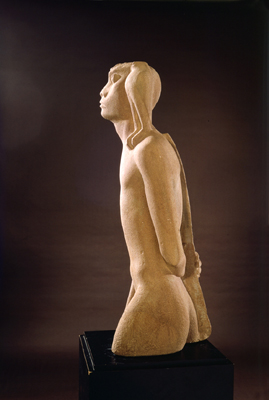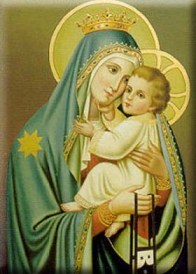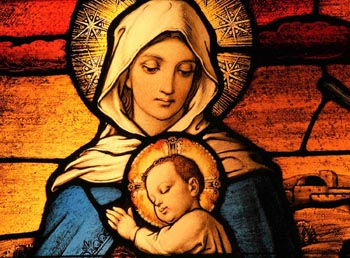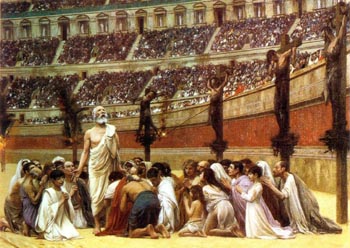|
THREE
The Clever Plan
Before Christmas became officially a Christian holiday another celebration called "The Annunciation of the Virgin Mary" was already in the works. Fragments of this celebration are said to be traced as far back as the second century. Today it continues to be observed on its appointed date March 25. Its purpose or intent is said to be dedicated to the miraculous conception of Jesus. March 25 and December 25 are nine months apart. An indicated time span from conception to birth. But like the birth date of Jesus there is no record of when Mary conceived. These two observances, however, intertwine harmoniously together. Strange coincidence or an exceedingly clever plan?
The Annunciation is not much different from other non-Christian religious observances, past or present. It is not uncommon to find the goddess image exalted to a higher plane, and Mary is represented much in the same fashion. Mother-child worship was revered among the heathens as the most sacred of all worships. The Queen of Heaven, or Semiramis (as she has been referred to) was the first mother goddess. She was the wife of Nimrod.
 Nimrod, in Old Testament times, was the one who established the first earthly kingdom. He appointed himself as god over Babylon and thus became a very powerful figure. Upon his death, Semiramis declared Nimrod's life to be forever preserved in an evergreen tree. She claimed that from out of the dead stump his eternal life came forth over night. In the minds of the people it was a miracle and the evergreen tree has ever since been a symbol of eternal life throughout the world. This belief is mingled in and around hundreds of different religions. Nimrod, in Old Testament times, was the one who established the first earthly kingdom. He appointed himself as god over Babylon and thus became a very powerful figure. Upon his death, Semiramis declared Nimrod's life to be forever preserved in an evergreen tree. She claimed that from out of the dead stump his eternal life came forth over night. In the minds of the people it was a miracle and the evergreen tree has ever since been a symbol of eternal life throughout the world. This belief is mingled in and around hundreds of different religions.
Her son Tammuz, who was born long after Nimord's death, thus making him an illegitimate child, became the messiah of Babylon. Semiramis claimed herself to be the virgin foretold in Scripture and Tazzuz, the seed of Salvation as Nimrod incarnate - making him a highly worshiped deity.
A great festival for the Queen of Heaven (the fertility goddess) came during the spring months we know today as March and April. Her son's birth celebration came during the winter solstice (also called Saturnalia), our month of December. Some evidence indicates the specific dates were March 25 and December 25.
During those days the abominations of Babylon became so severe God could not bear its iniquities any longer. He confused every man, woman, and child's tongue scattering mankind across the earth (Gen. 11:1-9). But the love of Nimrod and the Queen of Heaven with child, Tammuz, survived in every part of the world. The names may have changed with the changing languages, but what they still represent has remained the same.
When God put an end to one universal language the web began to spin and it spun around the Church. Until knowledge became more widely distributed no one could see what was happening. Now, as we compare other religious observances to so-called Christian observances, the similarities are striking. The truth of where they originated, and for what purpose they originally held, can no longer be concealed. Evil has seeped into God's congregation polluting it with the same vain ideas the heathens shared.
 All across the world mother-child worship flourished, and in some nations it still does. In China, Tibet, and Japan we have mother-goddess Sing Moo; the ancient Germans called her Virgin Hertha; the Scandinavian thought of her as Disa; the Extruscan, Nutria. In India she is Isi with child Iswara; the Druid goddess, Virgo-Paritura; the Assyria, Rhea. To the Summmerian she was the well-known Venus or Fortuna; the Romans, Jupiter; and in Egypt, Isis with child Horus. In Asia she is Cybele with child Edoius; and in Jesus' day she was Diana or Artemis, as the Greeks referred to her (Acts 19:27, 35, 37). Today, many Christians know her as the Madonna or Mother Mary. All across the world mother-child worship flourished, and in some nations it still does. In China, Tibet, and Japan we have mother-goddess Sing Moo; the ancient Germans called her Virgin Hertha; the Scandinavian thought of her as Disa; the Extruscan, Nutria. In India she is Isi with child Iswara; the Druid goddess, Virgo-Paritura; the Assyria, Rhea. To the Summmerian she was the well-known Venus or Fortuna; the Romans, Jupiter; and in Egypt, Isis with child Horus. In Asia she is Cybele with child Edoius; and in Jesus' day she was Diana or Artemis, as the Greeks referred to her (Acts 19:27, 35, 37). Today, many Christians know her as the Madonna or Mother Mary.
Nimrod was a great hunter and came to be known as Baal. His wife's title, the female divinity, properly known as Ashtoreth in the Old Testament, is equivalent to Boalti. In English, Boalti means "My Lady", in Latin, "Mea Domina", and in Italian it is the popular Madonna. The Roman Catholic Church attempted to make Mary appear similar to the heathen goddesses to appease the pagans' superstitious minds, thus winning them over to Christ. It was a matter of competing for he holiest Mother image.
The heathens greatly adored their idols, making numerous statues resembling their gods and goddesses. So, likewise, statues of Mary were made. In some cases the very same statues once worshipped as Isis (with child) were conveniently renamed Mary with Child. But the church not only adopted heathen statues and festivals, they also embraced their idolatrous ideas. For example, Mary became the mediator between God and man based on the belief that the King Eternal could not be directly approached. Pagan rituals were also added to arouse a certain mystical enchantment, a human emotional fixation to lure in souls and keep them spellbound.
|
In the Wycliffe Bible Encyclopedia, we find this explanation: "These two, Ashoreth and Diana, who are essentially the same mother/goddess of Asia, are examples of the female images man set up for himself (of his self-projections, mentioned in Romans 1:21,23) to worship while personifying man's unbridled passions and lust, and are deities made in man's fallen image and after his own likeness. (Reprinted by permission of the Moody Bible Institute, Chiago, Illinois)
In the Bible it states: "For there is one God, and there is one mediator between God and men, the man Christ Jesus" (1 Timothy 2:5).
|
|
Mother/goddess Isis, said to have been introduced to Rome about 80 BC, is sometimes represented as standing on a crescent moon with twelve stars surrounding her head. This symbol has been applied to Mary, and can be seen in nearly every Roman Catholic Church on the continent of Europe, among various other places as well. Virgin Mary indeed became the symbol of the Queen of Heaven
Mother-child worship seeped into the Christian religion notably marked with the seal of mystery Babylon, the very seat of great apostasy. We know this thought was not conceived from the Bible for in Acts 19 it deals directly with the worship of the goddess Diana. Paul makes it clear that such worship is wrong, and in accordance with God's word he managed to turn many way from such a false concept. He did this even at the risk of harsh persecution. Paul had the opportune moment to sway the heathens over to Christ's side using their own ways to entice them (as the Roman Church later did), but instead Paul stated: "The mystery of iniquity doth already work" (2 Thess 2:7). In other words, the foundation was already being laid even upon the very day Paul spoke those words.
 Another great festival that has contributed to Christmas is the "Feast of Epiphany" . The source of this festival has been traced as far back as A.D. 200, and its reputed to be the second oldest festival on the Christian calendar. But like the rest of the heathen adoptions, it, too, has roots deeply planted in Babylon. Another great festival that has contributed to Christmas is the "Feast of Epiphany" . The source of this festival has been traced as far back as A.D. 200, and its reputed to be the second oldest festival on the Christian calendar. But like the rest of the heathen adoptions, it, too, has roots deeply planted in Babylon.
The church adopted this festival as a commemoration for the anniversary of Christ's baptism. Sometime later it paved its way to becoming "The Three King's Day". Epiphany simply means ‘manifestation’, the way something is revealed. Any dictionary will tell you that the Feast of Epiphany is a festival celebrated on January 6 as a celebration dedicated to Jesus. Its purpose revolves around the revealing of Jesus as the Christ to the Gentiles in the persons of the Magi, as well as representing the baptism of Jesus, commonly known as the Twelfth Day.
The heathens observed a celebration closely related to Epiphany for the dedication to their water gods. Isn't it ironic how Christ's baptism (along with the thought of His first miracle, changing water into wine) fit ideally with the heathens theme? This festival is known to have a disgraceful history marked with frolicking as a special occasion for the "Feast of Fools" . There were certain members of the lower clergy who would choose their own bishop of fools that would then hold a mock mass complete with all sorts of unusual ceremonies. In the fifteenth century these customs became too distasteful and an official censure suddenly put a stop to them. Epiphany took on a new purpose revolving more around the Wise Men.
In a sense, Epiphany came to mean East meets West. The story is told that God could not be contained by only a few who recognized the message of salvation, but was to include all people. The star students signified a new dawn had come. The light that was to come for all had finally shown brightly. The Greek word, epiphaneia, draws us to the one appearing to us, for God is seeking man. When the sky lights up with the splendor of God in the magnificent star, which beckoned the Wise Men, God is the illuminator, the students of the stars are the illuminated. (Dennis Maralia, "Story of Wise Men Has Contemporary Message: Relgion," News-Review, January 8, 1988, p. 10.)
 During the first few centuries of the Christian era, many people had a helping hand in setting up the scenes for the numerous images of biblical times. These are the images we behold in our minds today, images of pure imagination. Through the love of beautiful art, artist were not only inspired but encouraged to paint magnificent pictures depicting biblical times. Of course, the greatest admiration revolved around the Virgin Mary with the Child Jesus. It was the desire to have images, like the heathens possessed, that caused a turn of events to emerge that took simple biblical accounts making them flourishing moments centered around a rich illusionism for deep majestic meaning. Poets were deeply moved by all the beautiful art and they composed some of the most heartwarming verses known to mankind. This further enhanced the splendor of this new and exciting spiritual fantasy. With the passing of time the image of Mary took on the role as the Madonna, and the Wise Men took on the image of kings. Together they formed the bond which tied the knot for the birth celebration for Christ. It would be a celebration that would outshine all others for a greater future purpose. During the first few centuries of the Christian era, many people had a helping hand in setting up the scenes for the numerous images of biblical times. These are the images we behold in our minds today, images of pure imagination. Through the love of beautiful art, artist were not only inspired but encouraged to paint magnificent pictures depicting biblical times. Of course, the greatest admiration revolved around the Virgin Mary with the Child Jesus. It was the desire to have images, like the heathens possessed, that caused a turn of events to emerge that took simple biblical accounts making them flourishing moments centered around a rich illusionism for deep majestic meaning. Poets were deeply moved by all the beautiful art and they composed some of the most heartwarming verses known to mankind. This further enhanced the splendor of this new and exciting spiritual fantasy. With the passing of time the image of Mary took on the role as the Madonna, and the Wise Men took on the image of kings. Together they formed the bond which tied the knot for the birth celebration for Christ. It would be a celebration that would outshine all others for a greater future purpose.
It's understandable how this plan prospered by maneuvering the people into a vulnerable mood of emotion. Eventually, most of Christ's followers came to embrace the idea of His birth celebration as an innocent display of devotion. Many generations passed away before this plan could take its full force, after thousands had gone to their graves with their undying faith in the the true word of God.
It happened at a moment in time when the world was limited, communications were limited, and knowledge of the Scriptures was limited to those higher up in the clergy. Truth was not openly available making new ideas a tantalizing way to lure many a heart into serving the creature rather than the Creator. Since the people did not know God's instructions personally, they followed the the laws established by the church. At that moment in time these words never rang more true:
|
For the wrath of God is revealed from heaven against all ungodliness and wickedness of men who by their wickedness suppress the truth. For what can be known about God is plain to them, because God has shown it to them. Ever since the creation of the world His invisible nature, namely, His eternal power and deity, has been clearly perceived in the things that have been made. So they are without excuse; for although they knew God they did not honor Him as God or give thanks to Him, but they became futile in their thinking and their senseless minds were darkened. Claiming to be wise, they became fools, and exchanged the glory of the immortal God for images resembling mortal man or birds or animals or reptiles. Therefore God gave them up in the lust of their hearts to impurity, to the dishonoring of their bodies among themselves, because they exchanged the truth about God for a lie and worshipped and served the creature rather than the Creator (Roman 1:18 - 25)
|
|
The church was exceptionally zealous about these new images and celebrations. The people were told that these things were for the sake of a better understanding toward the Lord, and if any disagreed with the authority of the church, they tortured and often put to death all in the name of Jesus Christ.
The Roman Empire had first massacred those who served Christ, then after converting to Christianity, they began to kill those who did not serve Christ, their way. Those, however, who refused to compromise surely knew what Jesus taught. They clung to His Word that God is Spirit and must be worshipped in Spirit. They did not fall captive to foolish ideas lacking spiritual wisdom for they knew any other way was folly, leading to the path of destruction. Their lives were a sacrifice to prove this point for future generations, in hope that it would not be a point carelessly forgotten. So why are we embracing one of the very idolatrous things they refused to serve: heathen festivals? They may be in Christ's name, but in name only will they ever be.
 |
|
We learn in Wycliffe Bible Encyclopedia : "The word Idolatry is a transliteration of the Greek word eidololatria, which we understand to mean the worship of idols: the worship of images as divine or sacred. This Greek term is compound of two. The first is eido (the Latin video), meaning to see and to know; hence it carries the basic concept to know by seeing. On this term was formed the word eidolon (iamge), which came to mean specifically an image of a god as an object of worship, or a material symbol of the supernatural as such an object. The second term is lateria, meaning service or more especially, the service or worship of the gods. Idolatry, then, is paying divine honours to any item of human fabrication, or the ascription of divine powers to purely natural agencies.
The early Christians unavoidably came in contact with Gentile idolatry (Acts 17:16). Thus they often had to face questions concerning the festive meals and meat offered to idols (Acts 15:20; I Peter 4:3; Rev. 2:14, 20), especially at Corinth (I Cor. 8,9). The sources of idolatry is basically an impure heart and will (Rom. 1:31). Paul agrees with Isaiah that man degenerated to heathenism rather than evolved from it (Rom. 1; Isa. 44). Therefore He commands Christians to flee from idolatry (I Cor. 10:14), as does John (I John 5:31)." (Reprinted by permission of the Moody Bible Institute, Chicago, Illinois).
|
|
When it came to tradition, the apostles never appealed to human tradition, always to Scripture. So the only traditions they continued to teach until their death was what Christ taught, imploring others to do the same.
|
Wycliffe's defines tradition: "The Greek word paradosis occurs 13 times in the New Testament and is used in the sense of a teaching that is handed down from one person or group to another. In the New Testament the term has two general meanings. It is used to refer to the oral interpretation of the Old Testament, particularly of the law of Moses, and the teaching of the Jewish elders and rabbis. It was called Halakah in Jewish literature and was later written down and preserved in Mishnah and the Talmud. These traditions were often accorded authoritative status equal to that of the Old Testament Scriptures."
Jesus sternly rebuked the Pharisees for such an attitude toward tradition: "They had forsaken the commandments of God in order to keep their own traditions, the tradition of men (Mark 7:3; Matt. 15:1)." The tradition of the elders blinded men to their basic spiritual need by making the observances of many external forms and essential qualification in order to be accepted with God. The word is also found in Col. 2:8 in a slightly broader sense that includes all merely human teaching.
One three occasions Paul uses the word to denote his teaching (1 Cor. 11:2; Thess/ 2:15; 3:6). They were the teaching of an inspired apostle and were to be received and held on to because the authority of heaven was behind them. In the early Church the oral tradition of eye witnesses to the acts and teaching of Jesus was considered authentic and of great importance (Heb. 2:3, 4). Luke made use of such tradition, which was handed down (from Greek paradidomi, the verb corresponding to paradosis) in the writing of his Gospel (Luke 1:2). (Reprinted by permission of Moody Bible Institue, Chicago, Illnois.)
|
|
There is no denying Christmas is not a tradition handed down by Christ or His apostles. So if God declared that there is no spiritual worthiness in human tradition then what makes one think Christmas is such an honorable cause? And how can the clergy even teach such a thing? Does this make the imaginations of human mind a supreme power above God? Can the authority of mortal man be more divine than the authority of our Creator so as to turn an illegal adoption into a blessing? Whether one realizes it or not, the bold message being flaunted by mankind is that human wisdom is greater then God's wisdom since man knows better how to serve his Lord than his Lord knew how to instruct him. But God knows that what man has done is set himself up as a prisoner chained to his own words.
|
The Expository Dictionary of Bible Words by Lawrence O. Richards reveals: "One who submits to a power other than God is taken captive, and his or her freedom is curtailed. Col. 2:8 warns against letting ourselves be taken captive (sylagogeo, to be carried away as booty) through hollow and deceptive philosophy, which depends on human tradition and the basic principles of this word rather than on Christ. In context, the Colossians are warned against adopting limited do's and don'ts as measures of spirituality. Spiritual achievement calls for personal allegiance to Jesus, not to standards invented even by a believing community.
In 2 Timothy 2:26, there is a warning that Satan seeks to trap (zogreo) human beings in misunderstands of the gospel and of its righteous way of life in order that such individuals may do his will (Eph. 4:8; Psalms 68:18).
In these and other New Testament passages, we see that we are to allow nothing to take us captive and thus win control over our actions. We remain free by being personally obedient to Jesus Christ as He speaks to us in His word and by His spirit.
Jesus attacked the Pharisees, pointing out how their interpretations actually nullified God's clear intent. He applied the words of Isaiah to them; These people honor me with their lips, but their hearts are far from me. They worship me in vain; their teachings are but rules taught by men. (Taken from Expository Dictionary of Bible Words by Lawrence O. Richards. Copyright 1985 by the Zondervan Corporation. Used by permission.)

Fausset's Bible Dictionary confirms: Tradition can authenticate a fact but not establish a doctrine. Paul's tradition in 2 Thessalonians 2:15 is inspired and only continued oral in part until the Scripture Cannon was completed by John: altogether different from Rome's supplementary oral traditions professing to complete the word, which is already complete, and which we are forbidden to ADD TO or TAKE AWAY from, on penalty of God's plagues, written therein (Rev. 22:18).
The Greek word Paradosis means Tradition, instructions delivered (1 Cor. 15:3) as inspired, whether orally or in writing by the apostle (2 Thess. 2:15, 3:6) has tradition in a good sense. In ten places, a bad sense (Mark 7:3, 5, 8, 9, 13; Gal. 1:14; Col. 2: 6-8). Jesus charges the Jews with making the commandments of God of none effect through your traditions.
Fausset's Bible Dictionary also tells us that the word paradosis, meaning tradition, is one of the only two nouns in two thousand in the Greek Testament that numerically equal 666. The other, euporia, meaning wealth, also equals 666. It is interesting to note that other sources claim that the Pope's title "Vicar of Christ" (written in Latin, Filii Vicarivas Dei) is said to have a numerical value totaling 666, as well. Latin was and still is the language the church uses in all her official acts
The church began in Rome and its original name was Saturnia, meaning "The City of Saturn" (Shobab Anishah). In Babylon, Nimrod was known as Saturn the heathen god, spelled in Chaldee (Babylon's language) as "Stur." This too is said have a numerical value totaling 666.
The present city of Rome (Romulus in Greek), derived from the Hebrew word romith, also equals 666. Nero Caesar, one of the greatest persecutors of Christians and emperor of Rome, (in Hebrew, Neron Caesar) again is said to equal 666.
|
|
Tradition and wealth, Rome and the Pope's title, they are all said to have the numerical value 666. Is this just a coincidence that they somehow tie together with the Anti-Christ number? Or could it be possible that these traditions, devised by the Roman Catholic Church and coming out of Rome flourishing with wealth, are not all they appear to be?
Out of all the contributing factors that have assisted in promoting the Christmas spirit, every one of them has been skillfully justified. This deception will be plain to see. And in spite of how cut-and-dried they may appear, as some have ventured to fabricate the situation, Christmas cannot ethically be explained by separating mankind into three groups: those who choose to honor it from a biblical perceptive (since there is none) those who choose to indulge in it from a commercial perspective (since this is inescapable); and those who choose to perceive its heathen origins (since few are aware of what this means). The picture, therefore, is substantially more intricate.
Evangelist Jimmy Swaggart maintains what most men of the cloth uphold, and frankly, they believe mankind can be separated into these three groups. Swaggart's booklet “Christ's Mass or Christmas” shares a few suggestions that most clergymen endorse. They teach and support the belief that knowing the truth about the heathen origin of Christmas should not obstruct attention from its true anointed intent. Christians are reassured that profiting from this event is not bad, though it should in no way take priority over its spiritual wealth.
Most every clergyman knows in depth the true history behind Christmas. It is too documented to deny. But they have in a rather clever way managed to gloss the truth over. They are aware that the Bible mentions nothing about a birth celebration for Jesus, yet they still claim Christmas as God ordained. “Regardless of whether God exhibited a desire to have a birth celebration for His Son, it should not limit us from expressing our love and devotion”, they preach. It is said time and again that every purpose, every reason, every praise is one we should devote toward God. And this sums up their entire reasoning.. They have little else to say on the subject, and this alone should draw suspicion.
This teaching, nonetheless, does not correspond with what the Bible instructs. God does tell us to honor Him in all things, this is correct. He also tells us what things do honor Him as well as what things do not honor Him. If someone steals in God's name, does this honor Him? If someone kills in God's name does this honor Him? Jesus said, "the truth will make your free" (John 8:32). There is a price for freedom: obeying God. God's freedom is not designed to let people run amuck as they please using His name for self-serving purposes as they so choose.
Jesus tell us that all things have been delivered to Him by our Heavenly Father. The Word is complete! He said, "Take my yoke upon you and learn from me" (Matt. 11:26, 29). What is significant to God has been revealed, and His followers will persistently follow His way having no need to add to or take away from the Word.
Conclusion: God's people will loathe the things Satan has established for one simple reason -
That crafty serpent cannot be trusted!
(All rights reserved, including the right of reproduction in whole or in part in any form.
Copyright 1990 / ISBN: 0-533-08812-7 / Library of Congress Catalog Card No : 89-90466 (Out-Of-Print)
|